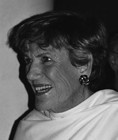ORFEO International – Reviews
Important Releases Briefly Introduced
October 2006
ORFEO 1 CD C 714 061 B
Inge Borkh
Inge Borkh made operatic history as Salome and Elektra, and she will continue to fascinate future generations of listeners with her recordings of these roles. The present portrait demonstrates that her artistic range was far greater than these two parts, however central they may have been to her repertory: it focuses on less familiar facets of her work and includes previously unpublished recordings and rarities from the early years of her career.
Pride of place 
Inge Borkh on her 85th birthday
Foto: privategoes to the scene with which Inge Borkh became famous overnight in 1951: Magda Sorel’s monologue from Gian Carlo Menotti’s The Consul. The fact that her audience in Berlin responded to her penetrating account of this scene by clapping, stamping and shouting was far more than mere acclaim for a great singer. At the same session she also recorded a second great scena on the subject of freedom, Leonore’s Abscheulicher from Beethoven’s Fidelio. Inge Borkh’s recording of an aria feared by every soprano is rightly regarded in collectors’ circles as one of the finest versions available.
Among previously unpublished recordings are two longer excerpts from Der fliegende Holländer and Aida, the latter with the soprano’s husband, Alexander Welitsch, as Amonasro. Both afford impressive proof of the lyrical qualities of a singer who always set great store by keeping her voice lean-toned and flexible.
No portrait of Inge Borkh would be complete without two highlights that have hitherto circulated only on the ‘grey’ market: her thrilling Eglantine from Euryanthe in a performance conducted by Carlo Maria Giulini and the rousing final duet from Andrea Chénier with Richard Tucker.
top |